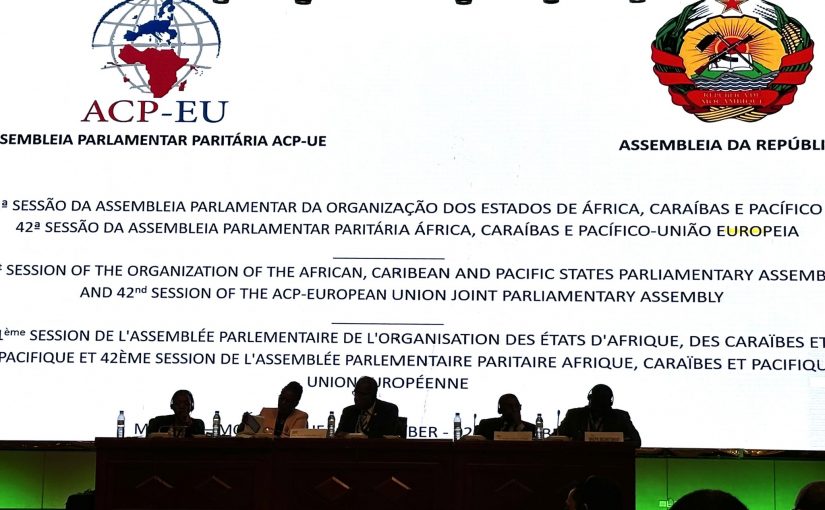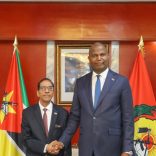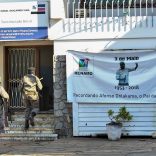Mozambique working to legalize status of its citizens in Tanzania
Calls for South Africa to reconsider leaving the OACPS

Photo: OACPS Secretariat on Twitter
Member countries of the Organization of African, Caribbean and Pacific States (OACPS) are calling the South Africa government to reconsider its position to quit the organization due to its relevance in international cooperation fora, especially discussions of a new Cotonou Agreement with the European Union (EU).
The call was made on Thursday (27), in Maputo, during the 61st Session of the Parliamentary Assembly of the Organization of African, Caribbean and Pacific States (OACPS) and the 42nd Session of the Joint Parliamentary Assembly Africa, Caribbean and Pacific – European Union (ACP-EU).
“The Community of Southern African Countries (SADC) is expected to convene a meeting to convince the South African government to return to the OACPS, said the Malian deputy Assarid Imbarcounane.
Imbarcounane says South Africa’s withdrawal from the OACPS is a major loss for the organization, hence the need to negotiate with the government of Cyril Ramaphosa for the country’s return.
“South Africa is a powerful partner in our organization, that’s the reason so we want it to come back”, he added.
According to OACPS Assistant Secretary-General, Norbert Ibrahim Richard, South Africa’s decision is a major blow since it may discourage the remaining member countries.
“The Secretary General received a letter from South Africa’s Director for International Cooperation expressing its decision to leave the OACPS with immediate effect starting on 2 September”, he said.
Addressing the OACPS 61 session of the Parliamentary Assembly in Maputo, Mozambique, Assistant Secretary-General, Dr Norbert Ibrahim Richard, said South Africa exited the organisation to pursue South-South cooperation and advance the 2030 agenda. pic.twitter.com/JjINec5LY4
— OACPS Secretariat (@PressACP) October 28, 2022
In the letter, according to the Assistant Secretary-General, South Africa explains that it would rather prioritize other platforms, such as the African Union (AU) and SADC.
“This decision is South Africa’s own choice and we should respect it. This issue has to do with South Africa’s sovereignty”, Norbert Ibrahim Richard said, arguing that “in my opinion, South Africa has decided to change its foreign cooperation policy by focusing on other international platforms. These issues were raised in the letter.”
Also on the same occasion, the under secretary general expressed his concern with a number of countries with membership fees in arrears, leaving the organisation in an “unpleasant” financial situation.
“The financial condition of the organization is weak, so we should put pressure on our governments for more contributions”, he said.
Mathew Nyuma, deputy from Sierra Leone stressed “we can only challenge our partners if we have financial robustness. So it is important to contribute more. Our countries’ contributions are poor.”
Also the member countries congratulated Mozambique’s election to the chair of the OACPS and co-chair of the Africa, Caribbean and Pacific – European Union (ACP-EU), where it will be represented by Assembly of the Republic (AR) deputy and member of the Standing Commission, Ana Rita Sithole.
Speaking on behalf of Secretary-General George Rebelo Chikoti, Assistant Secretary Secretary-General Dr Ibrahim Richards said the OACP will remain a main respected voice in the multilateral efforts to solve the problems the world is facing. pic.twitter.com/1EhGp7bX0d
— OACPS Secretariat (@PressACP) October 28, 2022
The 61st session of the OACPS Parliamentary Assembly is having its plenary at the Joaquim Chissano center in Maputo, Mozambique.: pic.twitter.com/OC1myCPt7c
— OACPS Secretariat (@PressACP) October 28, 2022
2/ The agreement establishing the African, Caribbean and Pacific Group (ACP) in the revised Georgetown Agreement transformed the ACP into the OACPS in April 2020 – an organisation headquartered in Brussels composed of 79 ACP States who are signatories to the Cotonou Agreement.
— Vahini Naidu (@Vahini) October 24, 2022
5/ The P-CPA is *not* a trade agreement per se – market access for trade in goods have largely been superseded by Economic Partnership Agreements (EPAs) between EU and ACP States and in some cases, other “trade-related” areas are covered in the comprehensive EPAs.
— Vahini Naidu (@Vahini) October 24, 2022
7/ When a proposal was made for Geneva-based Missions to lead the P-CPA negotiations, the EC opposed it knowing that ACP trade negotiators in Geneva, being more competent on trade issues, would be more likely to identify the problems in these imbalanced texts.
— Vahini Naidu (@Vahini) October 24, 2022












Leave a Reply
Be the First to Comment!
You must be logged in to post a comment.
You must be logged in to post a comment.